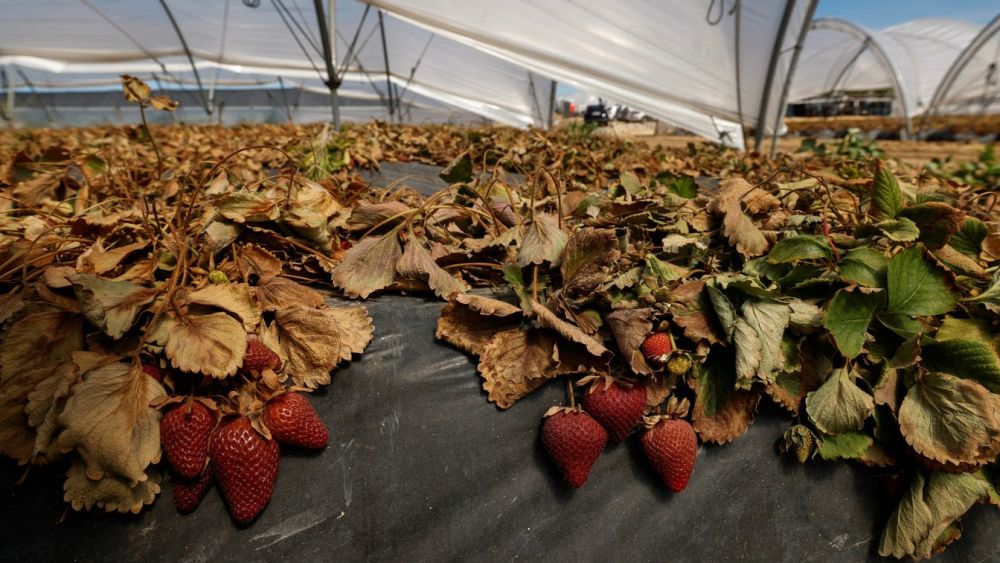
In March, the regional government passed a bill legalising the informal land occupation for intenstive irrigated strawberry farming.
A recent bill has legalised informal land occupation by strawberry farmers.
Environmental scientists are warning this will devastate the already imperilled nearby conservation area.
Earlier this month, a German consumer campaign called for supermarkets to boycott the berries grown near the marshlands.
Prolonged drought and illegal irrigation have dried out the wildlife haven in the southwest of the country. Scientists say the water needs of berry growers are making the problem worse.
The campaign on German online petitions site Campact had been signed by 150,000 people as of Wednesday.
Spanish strawberry growers association Interfresa has called it “insidious and damaging to the strawberry and red fruit industry”.
What is happening in Donana national park?
The Donana national park sits on top of a 2,700-square km underground water reserve, one of the largest of its kind in Europe and an area almost twice the size of London.
As Spain suffers through drought and unseasonably hot weather, the park’s lagoons and biodiversity are being depleted.
This year, Spain recorded its driest, warmest April since records began and many areas also experienced a record-hot May. Large parts of the country are under drought alerts and some are facing an emergency in terms of water availability.
Legalising strawberry farming will ‘devastate’ the Donana wetlands
Since the 1960s, the wetlands have also been endangered by intensive agriculture in the surrounding area as greenhouses and pipes take water from, in some cases, illegally drilled wells.
This leads to “profound shortage and pollution of surface water, ground water overexploitation, overgrazing and reccurent forest fires,” scientists Luis Santamaría and Julia Martin-Ortega wrote in a paper in Nature Water.
Permanent water bodies in the conservation area are shrinking and marshland vegetation is deteriorating.
“This pattern of relentless degradation is reaching a point of no-return,” added the scientists.
In March, the regional government passed a bill legalising the informal land occupation for intenstive irrigated strawberry farming.
A few weeks later, it also released a positive environmental impact assessment for a large housing development and golf course that would deplete Donana’s water yet further.
Scientists, conservationists and Spain’s national government have strongly criticised the farming bill.
“[It] not only fails to facilitate much-needed urgent action to revert the situation: combined with other flawed policies, it compromises past and current efforts to ensure Donana’s long-term survival,” Santamaría and Martin-Ortega wrote.
Why are German campaigners calling for a Spanish strawberry boycott?
The water-draining strawberry farming also sparked a in Germany.
It notes the huge volume of Spanish strawberries sold in the country and calls on Edeka, Lidl and other supermarkets to stop selling imported berries grown near the endangered wildlife sanctuary.
The province of Huelva, where the park is located, produces 98 per cent of Spain’s red fruits and 30 per cent of the EU’s. It is the world’s largest exporter of strawberries.
The petition comes as Spain’s right-wing opposition party won victories in regional elections, including in Andalusia, over the weekend.
The People’s Party is planning an amnesty that would legalise additional irrigation around Donana, despite outcry from environmentalists.
Reducing the amount of water extracted is one of the main solutions for saving the wetland, according to scientists.
Strawberry growers deny using illegal irrigation
Interfresa denies farmers were using water from illegal sources in the national park, or that huge quantities of water are being pumped, as the petition claims. It adds that they use cutting-edge techniques to guarantee an efficient use of water.
It says the closest farms to Donana are 35 km away and the vast majority of companies in the berry sector are 100 km or more from the area. This means only a small proportion of farms would make use of the irrigation system that will be legalised if the law is approved, it says.
Last month, 26 people were arrested for tapping illegal wells to grow tropical fruit in the drought-hit Axarquia area of Andalusia, 260 km east of Donana.